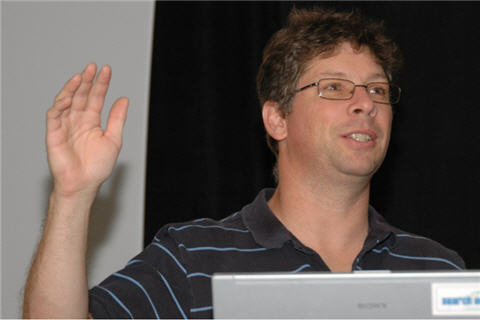Graphing social patterns: The intersection of search and social

The dean of search engine analysis Danny Sullivan, editor-in-chief of Search Engine Land, gave a talk on how "social" intersects with search at the Graphing Social Patterns conference in San Jose. At this point, there isn't much intersection between search and social. But, he said Facebook could enable social search within member groups and power vertical search categories, such as people and events. Sullivan doesn't expect Facebook to build its own Web search engine. Microsoft has shown how hard that can be, he said.
Sullivan started his presentation with a short history of search to put "social" in context. The first generation of search engines, such as Alta Vista, was characterized by the location frequency of keywords, as a way to achieve higher rank in search results, It put external control, or manipulation, of search results in the hands of Web masters. It also created a culture for spam.
In the second generation, Google came up with PageRank as a way to determine the value of links, independent of words, but then people started manipulating links to spam the engine. For example, you can buy links as a way to artificially raise page rank. The third generation, Sullivan said, is vertical search, with categories such as news and health.
Perhaps more personalized and social search are the fourth generation, but they aren't totally new. In general, the idea of personalized or social search is to reshape results by what you do on the Web, what others you know do or visit on the Web, or by taking into account the search behavior of aggregate of Web users, Sullivan said. He called Google's personalized (not social) search "ego reinforcement," given it is influenced by what Google tracks-- iGoogle home page content, bookmarks, your search history and Web history.
Eurekster started in 2004 with social search, allowing friends to influence search results. Subsequently, Eurekster came out with Swickis, more vertically oriented search technology that improves based on community usage. Yahoo's MyWeb promised to let uses tag results and then a network of friends would reshape search results in a more personalized and social fashion, Sullivan said. Eurekster is small and has some adoption (100,000 Swickis, according to the company), but Yahoo MyWeb has not been successful, he said.
Regarding Facebook, Sullivan showed that he has a lot in common with many of the more than 40 million who have signed up for the social network service. "I am still a Facebook virgin. I don't do as much with the service. I'm too old, have a network and am really busy," he said.
However, he believes that the social graph and social network data is potentially useful, although he doesn't like the term "social graph." "Why not call it 'social rank' or 'Mark rank,' " he said.
Facebook could launch a search engine that watches what others are searching on, monitors clicks in a more trusted environment and reshapes results based on what friends seem to like.
However, Sullivan said that Facebook wouldn't likely build a Web search engine from scratch and is more apt to partner with one of the biggies. Of course, if Google, Microsoft or Yahoo were to acquire Facebook that issue becomes moot. But at this point Facebook appears to be on an independent path.
Sullivan isn't sold on the social search idea, especially if you have lots of friends. "All of the sudden you have friend pollution. Do want these people messing with your search results," he asked You would have select your true friends, at the potential risk of upsetting those who didn't make the list, and then you would need to consider what you will share with whom, he said.
"In my view, searches generally work. I am not that thrilled about sharing with 'you.' Maybe eventually you want to share a particular query, but some searches don't make sense to share with anybody," Sullivan said.
Facebook search could work on an aggregate level, presenting results based on what a community or group likes. "That will not happen overnight at Facebook or Google," Sullivan said. In addition, Facebook could focus on a people search vertical, as Spock, ZoomInfo, Wink and several others have, and event search, Sullivan said.
Facebook could be major in discovery, which Sullivan called the cousin to search. "I want to find stuff, but I don't know what it is. A good traditional example of this is Google News. I just want to find out what is going on," Sullivan said. "It could be custom tailored for what to show you based on who you are and your social network."
For now, it would be great if Facebook just made search less rudimentary.
